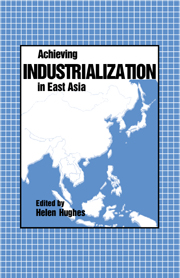Book contents
- Frontmatter
- Contents
- List of figures
- List of tables
- Contributors to this volume
- Preface
- Abbreviations
- Symbols
- 1 Economic Development in East Asia: Doing What Comes Naturally?
- 2 Industrialization and Growth: Alternative Views of East Asia
- 3 The Role of Trade Policies in the Industrialization of Rapidly Growing Asian Developing Countries
- 4 The Role of Foreign Capital in East Asian Industrialization, Growth and Development
- 5 The Role of Government in Overcoming Market Failure: Taiwan, Republic of Korea and Japan
- 6 Growth, Industrialization and Economic Structure: Latin America and East Asia Compared
- 7 Ideology and Industrialization in India and East Asia
- 8 Japan: Model for East Asian Industrialization?
- 9 The Politics of Industrialization in the Republic of Korea and Taiwan
- 10 Economic Growth in the Asean Region: the Political Underpinnings
- 11 Culture and Industrialization
- Bibliography
- Index
9 - The Politics of Industrialization in the Republic of Korea and Taiwan
Published online by Cambridge University Press: 06 October 2009
- Frontmatter
- Contents
- List of figures
- List of tables
- Contributors to this volume
- Preface
- Abbreviations
- Symbols
- 1 Economic Development in East Asia: Doing What Comes Naturally?
- 2 Industrialization and Growth: Alternative Views of East Asia
- 3 The Role of Trade Policies in the Industrialization of Rapidly Growing Asian Developing Countries
- 4 The Role of Foreign Capital in East Asian Industrialization, Growth and Development
- 5 The Role of Government in Overcoming Market Failure: Taiwan, Republic of Korea and Japan
- 6 Growth, Industrialization and Economic Structure: Latin America and East Asia Compared
- 7 Ideology and Industrialization in India and East Asia
- 8 Japan: Model for East Asian Industrialization?
- 9 The Politics of Industrialization in the Republic of Korea and Taiwan
- 10 Economic Growth in the Asean Region: the Political Underpinnings
- 11 Culture and Industrialization
- Bibliography
- Index
Summary
Over the 1970s, export-oriented industrialization achieved the status of a new orthodoxy in the development community. Import-substituting industrialization had long been subject to criticism on theoretical grounds, but the sustained economic success of the East Asian NICs – Republic of Korea, Taiwan, Hong Kong and Singapore – provided empirical ammunition for the critics. In addition to reducing the bias against exports through realistic exchange rate policies and selective import liberalization, the ‘outward-oriented’ strategy has been associated with a broader array of economic reforms: encouragement of foreign investment, financial reforms and, in general, a rationalization of incentives to reduce price and factor market distortions (Balassa 1981a). Though the mechanisms by which increased exports lead to increased growth remain a subject of some uncertainty, these countries are taken to vindicate neo-classical prescriptions, ‘taking off’ as the result of policies that allowed them to more fully exploit comparative advantage. Despite their heavy reliance on trade, the East Asian NICs continued to do well during the international economic turbulence of the seventies. As the World Development Report (1981:26) summarizes, ‘the flexibility that an outward orientation provides has outweighed the vulnerability that it risks’ (World Bank, various years).
There is an unremarked puzzle in the attention given to the East Asian ‘model’. If export-oriented industrialization is superior as a strategy, why has policy reform elsewhere proved so infrequent and hesitating? Why do countries persist in pursuing ‘irrational’ policies? Why, to repeat David Morawetz's question: ‘Are the emperor's new clothes not made in Colombia?’ (Morawetz 1981).
- Type
- Chapter
- Information
- Achieving Industrialization in East Asia , pp. 260 - 282Publisher: Cambridge University PressPrint publication year: 1988
- 23
- Cited by



